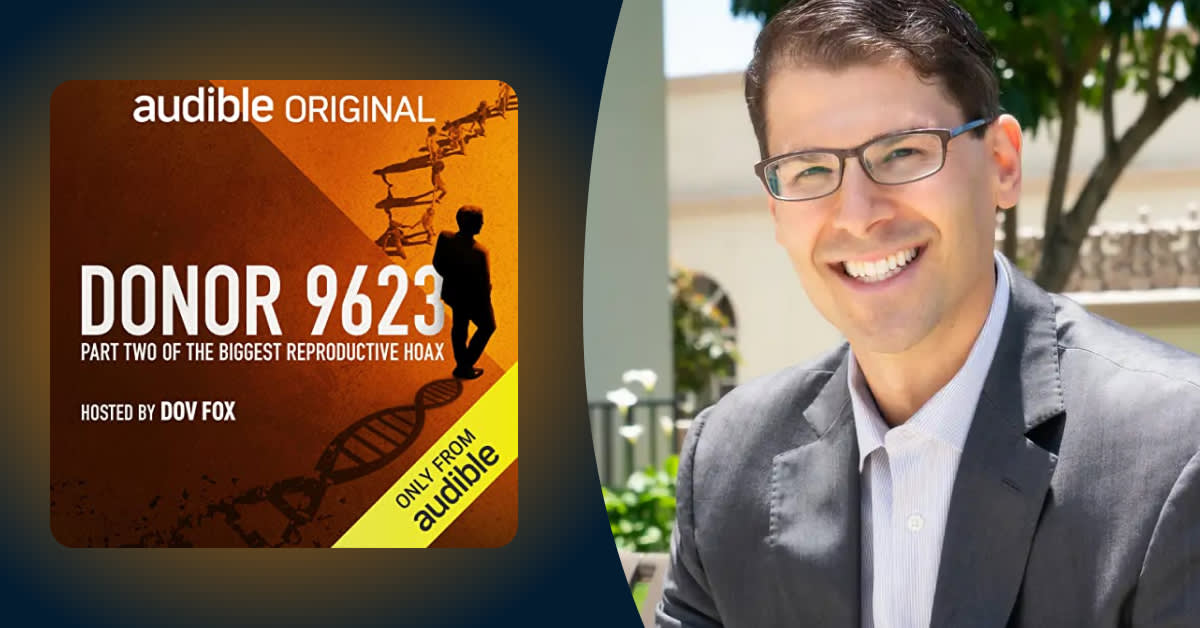In the investigative podcast , host and law professor Dov Fox unravels the strange case of a sperm donor who seemed to be the perfect biological father—a music prodigy and gifted athlete with a genius IQ. The only problem? It was all a lie. 36 children later, the truth about the biggest hoax in reproductive history finally came out in the explosive first season. As Fox returns with the podcast's hotly anticipated , he shares the inside story of Donor 9623.
Audible: Donor 9623 was a cult hit at Audible and introduced many people to just how unregulated the fertility industry is. What was most gratifying to you about the success of the series?
Dov Fox: Seeing signs of social change, and hearing from listeners about their own stories.
After the podcast came out in late 2020, the Georgia Supreme Court ruled in favor of Wendy and Alex Norman, who we get to know in the first season and this new chapter. The legal win entitled them to gather evidence and call witnesses under oath. Before that, every lawsuit by a 9623 family against the sperm bank had been settled or dismissed. The trial in Norman v. Xytex is scheduled for September 2023.
It’s not just a resolution in this one case. The release also brought outreach from lawmakers wanting to see what could be done to guard against deception like this in the future. I got to help draft and testify about legislation to enhance transparency in fertility practices.
In May 2022, Colorado passed a law requiring sperm banks to disclose a donor’s identity and family history, and also to cap at 25 the number of families that any given donor’s sperm can be sold to. It’s the first meaningful regulation of assisted reproduction in American history.
A national proposal would go further, mandating that tissue banks verify a donor’s medical information and share anonymized health records with aspiring parents. That federal bill would also require donors themselves to reveal any diagnosed conditions or genetic risks they know about.
“Steven’s Law” is named for the son of Laura and David Gunner, who we hear from in the first episode of Part Two. The Gunners used a sperm bank to conceive Steven. In high school, they say he transformed all of a sudden from a well-adjusted football captain to a deeply troubled teen. Doctors were stumped by the absence of any family history of mental illness. By the time Steven was diagnosed with schizophrenia, it was too late for effective treatment. He lost his life to an opioid overdose at just 27 in May 2020.
The podcast came out a couple months later. The Gunners used the Donor Sibling Registry that comes up in the second episode to connect with other families who had picked Steven’s donor. They found out that he had also been diagnosed with schizophrenia and hospitalized for it before becoming a donor—none of which was disclosed on his profile. They also learned that Steven’s donor had died of an opioid overdose too. Laura and David’s brave decision to come forward has had a powerful impact already, inspiring Steven’s Law and another one that’s pending in their home state of New York. Hearing from folks like the Gunners and seeing the difference they’re making has been incredible. And it’s starting to feel like a real turning point.Yeah. I figured they’d react pretty much the same. I mean, they’d all been lied to the same way, were now dealing with the same health risks, and had heard the same interview with the donor. I assumed those shared circumstances would dictate a similar response. What I didn’t realize is they were actually coming from diverse backgrounds, bringing distinct perspectives to a situation that’s far more complicated that I’d made it out to be in my head.






